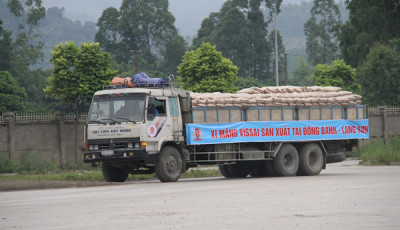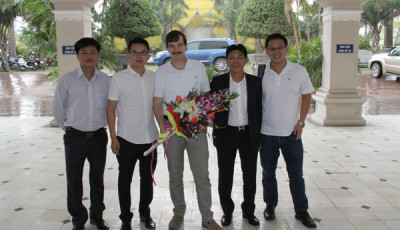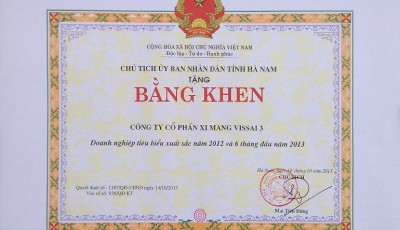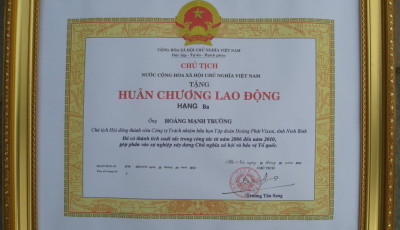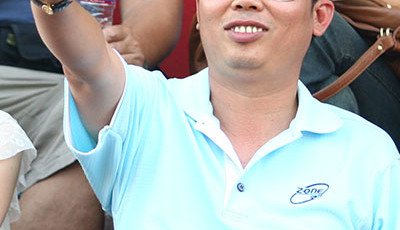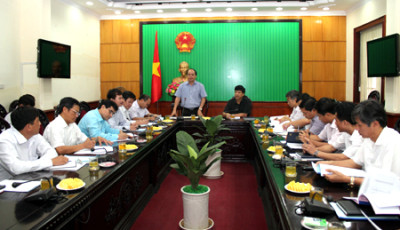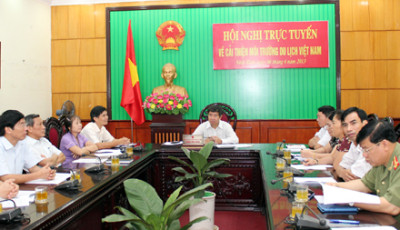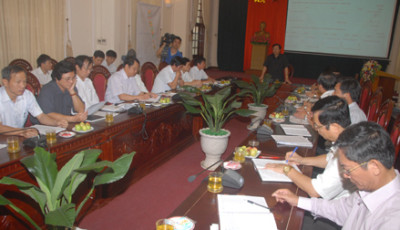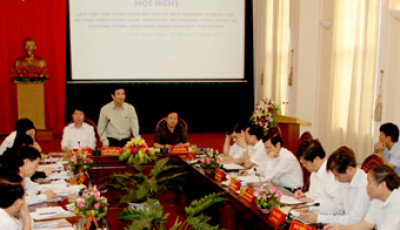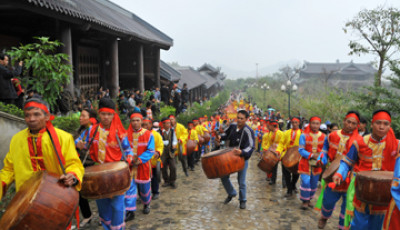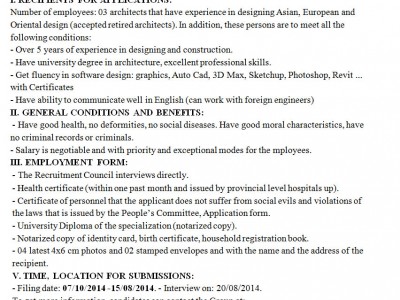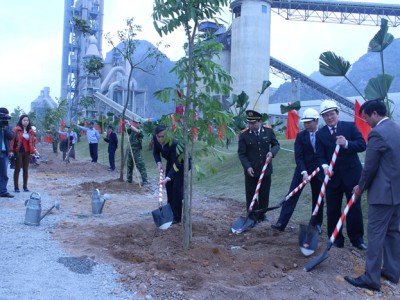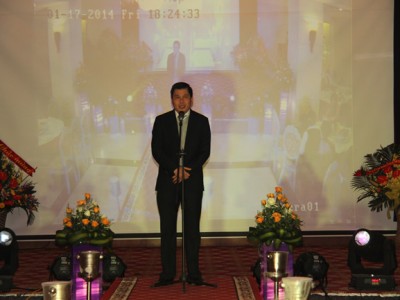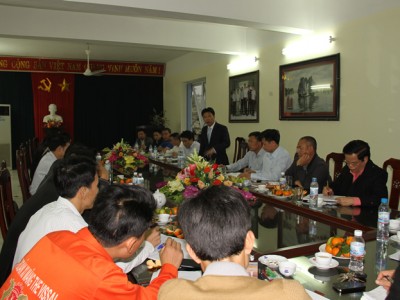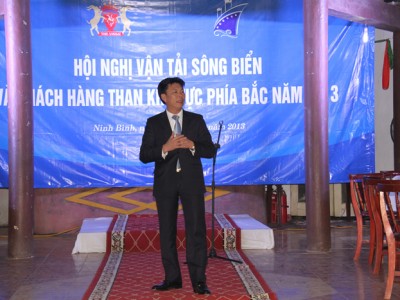Ninh Binh celebrity
Dinh Tien Hoang (924 – 979) and the reunification of the country
The real name of Dinh Tien Hoang is Dinh Bo Linh. He was born on the fifteen day of the second month of Giap Than lunar year (i.e. 22 March 924) at Kim Lu hamlet, Dai Huu village, Chau Dai Hoang which is now known as Van Bong hamlet, Gia Phuong commune, Gia Vien District.
He was a national hero who had scored many spectacular victories such as reunification, establishment of a centralized monarchy state, protecting and building a self-control independence from the Northern domination.
Dinh Quoc Cong Nguyen Bac (924 – 979)
Nguyen Bac is the First meritorious official, one of the four highest ranking court officials in Dinh dynasty. He was born in 924 (Giap Than). Later, he helped Dinh Bo Linh crush out 12 warlords. Thanks to his merit, King Dinh conferred him as Dinh Quoc Cong (position as prime minister in the court).
Ngoai Giap Dinh Dien (924 – 980)
Dinh Dien was born in Dai Huu village, the same one with King Dinh, which now belongs to Gia Phuong commune, Gia Vien district.
Dinh Dien was consistently loyal to the country. As a result, Le Hoan after becoming the King conferred him “Te the Ho Quoc Hien ung linh quang Dai Vuong”.
Army general Pham Bach Ho (910 – 972)
Pham Bach Ho’s real name is Phong At. He was born on the tenth day of the first month of Canh Ngo lunar year (22 February 910) in Ngoc Duong commune which currently belongs to Kim Dong district (Hung Yen).
During his life, Pham Bach Ho underwent two dynasties Ngo and Dinh. He used to be the founding meritorious official who helped dispel Nam Han army on Bach Dang River. He was one of the 12 warlords who had wisely put the country’s destiny as top priority.
Le Hoan (941 – 1005)
More than 1000 years ago, our nation has put into the history books a brilliant victory – defeating the invasions of Full Song Dynasty. Thanks to such event, the name of Le Hoan emerged in the nation’s history and deserved to be put on a par with other heroes such as Ly Thuong Kiet, Tran Hung Dao, Le Loi, Nguyen Trai and Quang Trung, etc. He was one of the great characters who rendered great services to the country.
Queen mother Duong Van Nga (952 – 1000)
Queen Duong Van Nga is a native of the Nho Quan (Ninh Binh). She is a beautiful and wise woman who was loved by King Dinh. After King Dinh passed away, before the fate of the country, she decided to put the country’s interests above the interests of her family and actively ruled the state affairs, leading to the unification of the court and peace to the nation.
Bonze Do Phap Thuan (916 – 991)
Do Phap Thuan is a famous meditation master in the former Le dynasty. He was born in 916, with surname of Do and legal name as Phap Thuan. He had produced many works of poetry and literature reflecting ethnic pride, not subduing to the invaders. His writings was one of the earliest works in Han character among Vietnamese authors.
Dao Cam Moc (? – 1015)
Dao Cam Moc used to be a high-ranking mandarin in the former Le dynasty. At the end of former Le dynasty, he associated with Bonze Van Hanh to help Ly Cong Uan become the King.
When Ly Cong Uan came to the throne, Dao Cam Moc was named Nghia Tin Hau and deserved well of the court. He was posthumously awarded the as A Vuong by Ly Thai To. He is one of two pillars of the Ly dynasty in the early days of construction..
Pham Cu Luong
Pham Cu Luong was a native of the old Chi Linh. He lived in a family of traditional martial arts. When Le Hoan came to the throne, Pham Cu Luong became the commander of naval forces and applied the tactics that had been used by Ngo Quyen in the past to destroy the enemy. Army general Pham Cu Luong had had glorious feat of arms and was posthumously awarded the high ranking mandarin by Le Dai Hanh. In many later dynasties, he was awarded as Thuong Dang Than.
Zen Master Van Hanh (?-1018)
He was born in a Nguyen family in Chau Co Phap, Bac Giang street which is now belongs to Tien Son district (Bac Ninh). He lived at the end of the former Le dynasty, mastering all the three religions. After reaching the peak of the Way, he became a famous Zen master who was then invited to attend the court as an advisor in managing the country.
Ngo Chan Luu (933 – 1011)
He was a famous monk in the Dinh-Le dynasty. His surname is Ngo while Chan Luu is his legal name. He was born in Cat Loi, Thuong Lac district (now belongs to Thanh Hoa.
By the reign of Le Dai Hanh King, Ngo Chan Luu was invited to participate in imperial affairs. He had had many poems and literary composition which had become unique with special value in the history of Vietnam ancient
Ly Cong Uan (974 – 1028) – Founder of Ly Dynasty
Ly dynasty started in 1009, which was an important event in the national history. Ly Cong Uan was considered to be the founder of Ly Dynasty, at the same time enlightened the Dai Viet civilization, became founder of Thang Long-Hanoi capital and deserved to be ranked as the Trung Hung ancestor of Vietnam nation. His 18 years as a King was the period when the country had many great changes. Vietnamese people are forever grateful for the merit of Ly Cong Uan.
Buddhist monk Nguyen Minh Khong (1066 – 1141)
His real name was Nguyen Chi Thanh who was born in Dam Xa commune, Gia Vien suburban district, Truong Yen district, which now belongs to Dam Xa village, Gia Tien commune, Gia Vien district. He was not only good at Taoism but also successful as a doctor. He cured for Prince Duong Hoan, who was then became King Ly Than Ton.
Truong Han Sieu (? – 1354)
Truong Han Sieu had his courtesy name as Thang Phu and official name as Don Tau, who was born in Phuc Thanh, Yen Ninh, Truong Yen district which now belongs to Phuc An hamlet, Ninh Binh city. He was a talented student. After the successful victory over Nguyen enemy, Tran Hung Dao nominated him to the court. Then he held various responsibilities of the court and deserved well of the country. He was repeatedly posthumously awarded higher ranking positions after his death and by the Nguyen dynasty, King Thanh Thai conferred a title on him as a God.
Trinh Loi (? – 1434) – With Lam Son insurrection
Trinh Loi was born in Khuong Lai hamlet, Son Duoc commune, Van Trinh canton, Gia Vien district (now belongs to Son Thanh commune, Nho Quan district, Ninh Binh province).
Trinh Loi was among 18 people who attended the Lung Nhai oath association with Le Loi in the early second month of Binh Than lunar year (1416). He was a famous general and a founding meritorious official of the Le dynasty.
Le Niem (1416 – 1485)
Le Niem was born in 141. Experiencing two reigns of King Le Nhan Tong (1442-1459) and King Le Thanh Tong (1460-1497), Le Niem was appointed important posts together with other founding meritorious officials such as Nguyen Xi, Dinh Liet, Le Lang, etc. He had many contributions to the internal affairs which was marked by the rebellion of Nghi Dan in 1460. He also significantly contributed to the military and foreign affairs as well as the national reconstruction process.
Ninh Dich (1687 – 1734) – A genius in Ninh Binh
He was born in Ninh Xa commune, Vong Danh district (now known as Y Yen district, Nam Dinh). He had strong will and talent and was regarded as an all-around hero. It is said that he was a genius of his homeland Ninh Binh.
Ninh Ton (1713 – 1790)
Ninh Ton was born in 1713 at the beginning of the reign of King Le Hien Tong. His homeland was in Coi Tri commune, Yen Mo district, Ninh Binh. He didn’t care about the fame and fortune but loved a pure noble life. He had gone through many positions such as “Han lam truc hoc si”, “Binh Bo thuong thu tuoc hau”, which proved Ninh Ton’s comprehensive capability in both literature and martial. He had many merits and significant contribution to the court and the country.
Le Khac Hai (1725 – 1814)
Le Khac Hai was born in An Thai village, Quang Phuc commune, Yen Mo district, Thanh Hoa region, which now belongs to Quang Phuc hamlet, Yen Phong commune, Yen Mo district, Ninh Binh province.
Being smart at school, he soon exposed his talent and qualities. Furthermore, he received the love and recognition from people by his honesty and willingness to support others without personal interest.
Vu Dinh Huan (1730 – 1801)
He was born in 1730 in Truong An hamlet, Phuc Lan ward, Qua Son commune, Phu Cat district, Binh Dinh. He soon joined Tay Son army and grasp many feats of arms. It can be seen that he was a shining example of being loyal to the king and patriotic.
Nguyen Cong Tru (1778 – 1858)
He was born in Uy Vien village, Nghi Xuan district (Ha Tinh). However, there was a period of time when he was attached to Ninh Binh and worked as Dinh Dien Su at the Kim Son land nowadays. He was born on the first day of the eleventh month if Mau Tuat.
He had gone through many positions in Ninh Binh and deserved credit for reclaiming the Kim Son land and expanding agriculture. Besides, he was a talent general with great art of war. For Ninh Binh in general and Kim Lien in specific, Nguyen Cong Tru had profound emotion and significantly contributions.
Pham Van Nghi (1805 – 1881)
Pham Van Nghi was a native of Tam Dang commune, An Trung canton, Dai An district, Nghia Hung prefect (now belongs to Tam Quang village, Yen Thang commune, Y Yen district). He was born on 22 Dec 1805 (the fourth day of the eleventh month of At Suu lunar year).
He was the 15th descendant of the family Pham Hoang Xa – Dai An that the ascendant Pham Dao Soan had come to Ninh Binh to settle from the early Le dynasty. Inherited from the ancestral tradition, Pham Van Nghi was so patient to practice and pass the baccalaureate degree in 1837 as well as second-rank doctor in 1838. It was thanks to not only his self-discipline, devotion to reading book or deep thinking but also his friendship, exchange of learning and reading with famous artists in Ninh Binh such as retired scholar Pham Duc Dieu – a native of Non Khe village, baccalaureate Vu Duy Thanh – a native of Van Bong village, Yen Khanh district and Vu Pham Khai – a native of Thien Tri village which now belongs to Phuong Tri village, Yen Mac commune, Yen Mo district.
As a mandarin, he used to be county chief of Ly Nhan (Ha Nam nowadays), academic composer, historical editor, provincial education officer in Nam Dinh. However, his life and career didn’t focus all in becoming a mandarin. The most noble and respectful character in this man was that he always took care of his citizens and country while underestimating the glory and perquisite. He came forward to ask for people in Ninh Binh and Nam Dinh to explore Dai An coastal area, set up Si Lam camp, saved people from hunger, bought rice fields for poor people or set up warehouse helping injured people from starvation, etc. He also organized a brave army to fight against the French invasion. Pham Van Nghi also left many patriotic poems and there are many patriotic scholars who used to be his students.
Vu Pham Khai (1808 – ?)
Vu Pham Khai was a historian, poet, writer and politician who had talents in many areas. He had the soul and aspiration of a patriotic elites. He had undergone three reigns of Minh Menh, Thieu Tri and Tu Duc dynasty with a full heart for the king and the country.
Vu Duy Thanh (1807 – 1861)
Vu Duy Thanh was a poet, reformer and an erudite scholar who lived a simple life close to the people. In the Dinh Dao exam, he used to propose 4 things in the way of King: To get the business first; To bring peace to the people; To take the class for root; To get elites for helping people. He always lived for the peace of people.
Nguyen Tu Man (1810 – 1901)
He was born in 1810 in Dong Cao village, Gia Ho commune, Ky Vi canton, which is now in Thu Dien village, Ninh Nhat commune, Hoa Lu district. Nguyen Tu Man was very knowledgeable about Ninh Binh geography. His works had much value attached to motherland and were precious documents on the ancient Ninh Binh. He is regarded as the geographer of Ninh Binh.
Nguyen Van Gian (1822 – 1892)
He was born in 1822 in Nam village, Phung Thien commune, Bong Hai canton, Yen Khanh district (now known as Nam village, Khanh Thien commune, Yen Khanh district). Nguyen Van Gian was simple, compassionate and frank. When the French invaded Vietnam, he commanded an army to have a drastic fighting with the enemy and won many victories in Ninh Binh.
Pham Than Duat (1825 – 1885)
He was born on the 24th day of the sixth month of At Dau lunar year (4 November 1825) in Yen Mo Thuong village, which is now known as Yen Mo Thuong, Yen Mac commune, Yen Mo district. During his life, Pham Than Duat was always dedicated to the cause of helping the country and its citizen, contributing to the fight against the invaders. He was honored and remembered by every one.
Second-best court counselor Pham Dan Que (1836 – 1876)
Pham Dan Que was born in Binh Than lunar year in Nhat village, Bong Hai commune, which is now known as Hieu Thien village, Yen Khanh district, Ninh Binh.
He was talented and faithful right from an early age. At that time, Bong Hai was the land of literature with the civilized Bong Chau. In such cultural environment, Pham Dan Que was inherited from the essence of education and quickly matured to be the second-best in the old mandarinal exam in Mau Ngo lunar year of the 11th Tu Duc reign (1858). In early 1863, he was nominated to hold the position of Ninh Binh Binh bo Vien Hoa ngoai lang. He was also recommended to be the Court counselor cum Hanh tau bo le who was often consulted by King Tu Duc. During his life, Pham Dan Que had gone through many important events.
Military affair Nguyen Tu Tuong (1844 – 1898)
Nguyen Tu Tuong, also Bang Tuong, was a dutiful son being given the words “Thuan Ton” (i.e. dutiful nephew). Later, thanks to his talent in literature, he was invited to be a mandarin by the Nguyen dynasty. He was also a Can Vuong righteous patriot who often gathered armies to participate in the uprisings.
Dinh Van Dien – A patriotic parishioners
It was unknown where his native village was, only known that it was in Yen Mo district. It was also unclear how he was born and died in, only known that he lived and worked in the reign of King Tu Duc. He was a Christian follower.
In November 1868, Dinh Van Dien submit a secret petition to King Tu Duc to propose some efficient works necessary to fight for the French invaders. Such proposals included setting up Nha Doanh square and Binh Chuan service everywhere to facilitate the circulation of foods; boosting the gold exploitation; ship building, asking Western people and British to be against the French invaders, reducing workload and increasing salary for their troops to be more concentrated on training. Well deserved soldier should be awarded worthily, wounded soldier must be nurtured for a lifetime and descendant of martyrs should be considered for employment.
Luong Van Thang (1865-1940)
Luong Van Thang was born in 1865 in a Confucian family in Lu Phong village, Quynh Luu (Nho Quan). His father was Luong Van Nhung, a patriotic Confucian scholar who had broad education. His mother was a hardworking farmer who spent most of the time on the field.
During his childhood, the boy Luong Van Thang had soon proved his cleverness, intelligence and courtesy. He received the love and care from his family to go to school. When he grew up, he was sent to Nam Dinh city to follow a moral and patriot teacher. Luong Van Thang progressed a lot while receiving the love from his friends and teacher. His main subject was Confucianism, yet he was fluent in the national language.
Being well educated, Luong Van Thang soon realized the injustices in the society, the opposition between the misery of people and the luxury and futility of the imperialists. After passing the baccalaureate, Luong Van Thang didn’t work for the feudal imperialist but came back home for medicine and teaching. Living in harmony with the neighbors, Luong Van Thang felt sympathetic for the poor labor. He always helped them when they were weak and was dedicated in teaching students. On the contrary, he hated the officials who always tried to clean others out.
The older he was, the more profound academic reputation of Luong Van Thang widespread. He was respectfully called as “Quynh village bachelor” who was teacher of many students around the region.
Dinh Tat Mien – the first secretary of the Indochina Communist Party in Ninh Binh province
Dinh Tat Mien (1891-1939) was born in a peasant family, which is now in Son Thanh commune, Nho Quan district.
During his childhood, Dinh Tat Mien was very eager to study. He used to go to Ha Nam for following Tam Nguyen Yen Do Nguyen Khuyen. Together with Han .
On 24 June 1929, the Vietnamese Revolutionary Youth League in Lu Phong transformed into the Indochinese Communist Party whose secretary was Luong Van Thang. Dinh Tat Mien was also admitted to the original LU Phong Party cell. After that, Dinh Tat Mien was assigned to the Party foundation in Say village. By the prestige and clever mass mobilization, Dinh Tat Mien had built up a solid system from his own home, where the communist ideology was disseminated to the poor labors. On 15 August 1930, the first Party cell of Say village was established under the
Leadership of Dinh Tat Mien. In order to facilitate the revolutionary activities, he stopped teaching and switched to a herbalist writing out a prescription. When curing others, he often let the leaflet in medicine in order to propagate the communist ideology to the whole area in Nho Quan.
(According to Ninh Binh Celebrities – Pham Dinh Nhan)




